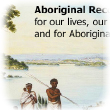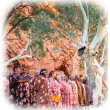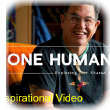07 September 2024
 The video Why Should Christians, Muslims, Jews, and All People of Faith Walk to Places of Worship to Save the Environment? emphasizes the shared responsibility across religious traditions to protect the environment, highlighting the sacredness of creation in Christianity, Islam, and Judaism. It presents examples such as Franciscan monks in Assisi, Italy, the 'Walk to Jummah' campaign in Birmingham, UK, and the Jewish Community Project in New York City, where congregants walk to worship to reduce their carbon footprint and embody their faith’s teachings on stewardship. Walking to places of worship is portrayed not only as an environmentally conscious act but also as a spiritual practice that deepens believers' connection to creation. Communities like the Green Anglican Movement in Nairobi and Grace Cathedral in San Francisco promote similar initiatives, aligning simplicity and sustainability with their religious values. The video concludes by emphasizing that the environmental crisis is both a moral and spiritual issue, and small actions like walking to worship can make a significant impact in preserving the planet for future generations. The video Why Should Christians, Muslims, Jews, and All People of Faith Walk to Places of Worship to Save the Environment? emphasizes the shared responsibility across religious traditions to protect the environment, highlighting the sacredness of creation in Christianity, Islam, and Judaism. It presents examples such as Franciscan monks in Assisi, Italy, the 'Walk to Jummah' campaign in Birmingham, UK, and the Jewish Community Project in New York City, where congregants walk to worship to reduce their carbon footprint and embody their faith’s teachings on stewardship. Walking to places of worship is portrayed not only as an environmentally conscious act but also as a spiritual practice that deepens believers' connection to creation. Communities like the Green Anglican Movement in Nairobi and Grace Cathedral in San Francisco promote similar initiatives, aligning simplicity and sustainability with their religious values. The video concludes by emphasizing that the environmental crisis is both a moral and spiritual issue, and small actions like walking to worship can make a significant impact in preserving the planet for future generations. | | | 12 July 2024
 Interactive practise multiple choice questions for the Post 1945 topic for Studies of Religion HSC Syllabus. Interactive practise multiple choice questions for the Post 1945 topic for Studies of Religion HSC Syllabus. | | | 09 July 2024
 Saint Francis of Assisi, a revered figure in Christian history, profoundly impacted service, love, peace, and environmental care, inspiring people worldwide. His dedication to serving others with humility, living in poverty, and showing compassion reflected his deep love for Christ and commitment to emulate His life. Francis's efforts extended beyond charity to radical solidarity with the poor, exemplified by his interactions with lepers and the impoverished. His commitment to peace was demonstrated by his dialogue with the Sultan of Egypt, emphasizing love and understanding over conflict. As the patron saint of ecology, Francis's reverence for creation and practical actions to protect animals have influenced modern environmental movements. Inspired by his example, contemporary leaders like Pope Francis and theologians such as Sally McFague emphasize ecological stewardship and the interconnectedness of all life. Saint Francis's holistic approach continues to challenge us to adopt a more compassionate and ecologically mindful lifestyle, aiming for a just, peaceful, and sustainable world. Saint Francis of Assisi, a revered figure in Christian history, profoundly impacted service, love, peace, and environmental care, inspiring people worldwide. His dedication to serving others with humility, living in poverty, and showing compassion reflected his deep love for Christ and commitment to emulate His life. Francis's efforts extended beyond charity to radical solidarity with the poor, exemplified by his interactions with lepers and the impoverished. His commitment to peace was demonstrated by his dialogue with the Sultan of Egypt, emphasizing love and understanding over conflict. As the patron saint of ecology, Francis's reverence for creation and practical actions to protect animals have influenced modern environmental movements. Inspired by his example, contemporary leaders like Pope Francis and theologians such as Sally McFague emphasize ecological stewardship and the interconnectedness of all life. Saint Francis's holistic approach continues to challenge us to adopt a more compassionate and ecologically mindful lifestyle, aiming for a just, peaceful, and sustainable world. | | | 07 July 2024
 The video 'Francis and the Sultan' explores the historical encounter between St. Francis of Assisi and Sultan al-Kamil of Egypt during the time of the Crusades. It highlights themes of dialogue, mutual respect, and understanding across religious and cultural divides.The story begins with the backdrop of the Crusades, specifically the conflict over Jerusalem, a holy site for both Christians and Muslims. Despite the ongoing violence, the video focuses on the efforts of Francis, who, disillusioned by the crusades' violence, seeks a path of peace and brotherhood. He travels to the Muslim camp, not as a crusader but as a peacemaker, aiming to understand and engage with the Muslim world through dialogue rather than confrontation. The video 'Francis and the Sultan' explores the historical encounter between St. Francis of Assisi and Sultan al-Kamil of Egypt during the time of the Crusades. It highlights themes of dialogue, mutual respect, and understanding across religious and cultural divides.The story begins with the backdrop of the Crusades, specifically the conflict over Jerusalem, a holy site for both Christians and Muslims. Despite the ongoing violence, the video focuses on the efforts of Francis, who, disillusioned by the crusades' violence, seeks a path of peace and brotherhood. He travels to the Muslim camp, not as a crusader but as a peacemaker, aiming to understand and engage with the Muslim world through dialogue rather than confrontation. | | | 01 June 2024
 Has anyone ever hurt you in your life? Have you been treated badly? Have the wrongs of the past affected who you are? When we spend time reflecting on our lives, we can see that hurts, ill-treatment, and wrongs have been part of our story. When we ponder these questions, we find no answers. Our ancestors remain silent. Yet, their effects impact us today. Psychologists recognize that trauma can be passed down from one generation to the next, revealing layers upon layers of hurts, ill-treatment, and wrongs. Has anyone ever hurt you in your life? Have you been treated badly? Have the wrongs of the past affected who you are? When we spend time reflecting on our lives, we can see that hurts, ill-treatment, and wrongs have been part of our story. When we ponder these questions, we find no answers. Our ancestors remain silent. Yet, their effects impact us today. Psychologists recognize that trauma can be passed down from one generation to the next, revealing layers upon layers of hurts, ill-treatment, and wrongs. | | | 26 May 2024
 In her TED talk, 'What We Carry for Our Ancestors: Intergenerational Healing,' Serene explores the profound impact of intergenerational trauma, particularly within indigenous communities, and shares personal insights into her journey towards understanding and healing. She discusses how historical oppressions, like the Native American boarding school era, have left deep psychological scars that manifest as internalized and lateral oppression within communities today. Through a personal narrative, including a transformative dream and the story of her late brother's struggles with addiction and trauma, Serene highlights the importance of reconnecting with cultural roots and community practices for healing. She advocates for integrating traditional healing methods with clinical approaches to address the deep-seated pain passed down through generations, ultimately encouraging individuals to confront and transform inherited traumas into a source of strength and renewal In her TED talk, 'What We Carry for Our Ancestors: Intergenerational Healing,' Serene explores the profound impact of intergenerational trauma, particularly within indigenous communities, and shares personal insights into her journey towards understanding and healing. She discusses how historical oppressions, like the Native American boarding school era, have left deep psychological scars that manifest as internalized and lateral oppression within communities today. Through a personal narrative, including a transformative dream and the story of her late brother's struggles with addiction and trauma, Serene highlights the importance of reconnecting with cultural roots and community practices for healing. She advocates for integrating traditional healing methods with clinical approaches to address the deep-seated pain passed down through generations, ultimately encouraging individuals to confront and transform inherited traumas into a source of strength and renewal | | | 22 April 2024
 'The Power of Us,' a National Geographic documentary, explores the evolution of human cooperation and leadership across various societies and historical contexts, drawing parallels and contrasts with modern political systems. The documentary begins with an examination of simple democratic systems in small tribes and evolves into a discussion about the complexities of governance in large modern states. It features an interview with former U.S. President Bill Clinton, who reflects on the challenges and responsibilities of leadership in a nation as large and diverse as the United States. 'The Power of Us,' a National Geographic documentary, explores the evolution of human cooperation and leadership across various societies and historical contexts, drawing parallels and contrasts with modern political systems. The documentary begins with an examination of simple democratic systems in small tribes and evolves into a discussion about the complexities of governance in large modern states. It features an interview with former U.S. President Bill Clinton, who reflects on the challenges and responsibilities of leadership in a nation as large and diverse as the United States. | | | 29 January 2024
 The YouTube clip about the Central Australian Aboriginal Women's Choir showcases the choir, which comprises members from six different communities. The women sing in Western Aranda, Pinjara (a living language of Central Australia), and English. Singing is portrayed as a vital aspect of preserving their language and culture. Some of the songs are newly written by choir members, while others date back to the 1920s, written by their ancestors. The choir members express a deep connection with their culture and heritage through their music, particularly enjoying sharing and celebrating their culture with others. The clip highlights the significance of their music in keeping the language alive and the personal impact it has on the choir members. The YouTube clip about the Central Australian Aboriginal Women's Choir showcases the choir, which comprises members from six different communities. The women sing in Western Aranda, Pinjara (a living language of Central Australia), and English. Singing is portrayed as a vital aspect of preserving their language and culture. Some of the songs are newly written by choir members, while others date back to the 1920s, written by their ancestors. The choir members express a deep connection with their culture and heritage through their music, particularly enjoying sharing and celebrating their culture with others. The clip highlights the significance of their music in keeping the language alive and the personal impact it has on the choir members. | | | 25 January 2024
 The video 'One Human Family' by Jay Bowen from the Upper Skagit Tribe encapsulates a profound message of interconnectedness, wisdom, and cultural values. Jay Bowen begins with a historical anecdote about the Hopi elders and their philosophy of universal kinship, emphasizing the tribe's deep-rooted belief in listening with the soul. He highlights the importance of leaving prejudices behind, valuing the wisdom of silence and elders, and recognizing individual gifts for communal service. Drawing on his personal reflections and the practice of writing 'Morning Musings,' Jay Bowen underscores the impact of our actions on others and concludes with a powerful reminder of our shared humanity and responsibility, advocating for the acknowledgment of everyone's indigenous roots to the Earth and the necessity of nurturing our universal family. The video 'One Human Family' by Jay Bowen from the Upper Skagit Tribe encapsulates a profound message of interconnectedness, wisdom, and cultural values. Jay Bowen begins with a historical anecdote about the Hopi elders and their philosophy of universal kinship, emphasizing the tribe's deep-rooted belief in listening with the soul. He highlights the importance of leaving prejudices behind, valuing the wisdom of silence and elders, and recognizing individual gifts for communal service. Drawing on his personal reflections and the practice of writing 'Morning Musings,' Jay Bowen underscores the impact of our actions on others and concludes with a powerful reminder of our shared humanity and responsibility, advocating for the acknowledgment of everyone's indigenous roots to the Earth and the necessity of nurturing our universal family. | | |
|


